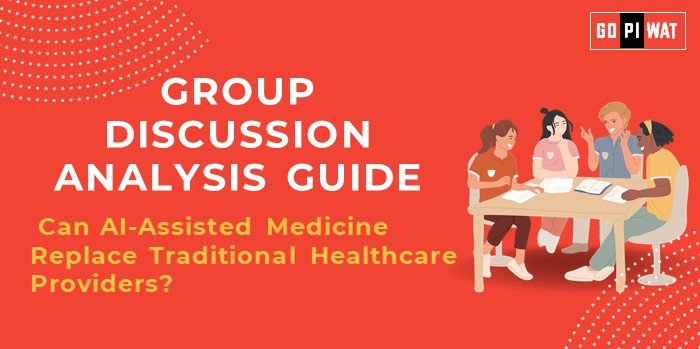📋 Group Discussion Analysis Guide
💻 Can AI-Assisted Medicine Replace Traditional Healthcare Providers?
🌟 Introduction to the Topic
- Opening Context: With advancements in artificial intelligence (AI), the healthcare sector is witnessing a transformative phase, raising questions about the future of traditional healthcare providers.
- Topic Background: AI in medicine has made significant strides, from diagnostics to personalized treatment plans, sparking debates about whether it can replace the human touch in healthcare.
📊 Quick Facts and Key Statistics
- 📈 AI Diagnostics Accuracy: Over 90% accuracy in detecting diseases like breast cancer (2023) – showcasing the potential to outperform human expertise in certain areas.
- 💰 Healthcare Spending Efficiency: AI adoption in U.S. hospitals projected to save $150 billion annually by 2026.
- 🌍 Global Market Size: The AI healthcare market is valued at $15 billion (2024), growing at 41.7% CAGR.
- 🏥 AI Adoption: 35% of hospitals globally use AI-assisted tools for diagnostics and patient management.
- 👩⚕️ Human Resource Gap: WHO estimates a global shortage of 15 million healthcare workers by 2030, emphasizing AI’s role in bridging the gap.
👥 Stakeholders and Their Roles
- 🏥 Healthcare Providers: Incorporate AI tools to enhance efficiency and accuracy.
- 💻 Technology Companies: Develop AI solutions tailored to medical needs.
- 🏛️ Governments and Regulators: Ensure ethical implementation, patient safety, and data privacy.
- 🧑🤝🧑 Patients: Embrace AI for improved diagnostics and treatment options while voicing concerns about data security.
🏆 Achievements and Challenges
✨ Achievements:
- 🩺 Improved Diagnostics: AI systems like IBM Watson have revolutionized early detection of diseases.
- 💰 Cost Efficiency: Reduction in operational costs for hospitals.
- 📡 Accessibility: Telemedicine powered by AI has extended healthcare to remote areas.
- 🎯 Personalized Treatment: AI tailors therapy plans to individual patient profiles.
⚠️ Challenges:
- ⚖️ Ethical Concerns: Bias in AI algorithms could lead to disparities in treatment.
- 🔍 Reliability: AI still requires human oversight to avoid diagnostic errors.
- 📉 Job Displacement: Potential reduction in demand for certain healthcare roles.
- 📜 Regulatory Hurdles: Ensuring compliance with global health standards.
🌍 Global Comparisons:
- 🇺🇸 U.S.: Leading in AI adoption with extensive research and implementation.
- 🇮🇳 India: AI improving rural healthcare delivery but facing infrastructure limitations.
📖 Case Studies:
- 🇬🇧 Babylon Health (UK): Virtual consultations reducing wait times by 50%.
- 🇮🇳 Aravind Eye Care (India): AI detecting diabetic retinopathy efficiently in rural populations.
📄 Structured Arguments for Discussion
- Supporting Stance: “AI systems, with their superior diagnostic accuracy and cost-efficiency, have the potential to revolutionize medicine by supplementing and possibly replacing traditional providers in certain scenarios.”
- Opposing Stance: “AI lacks empathy and human judgment, critical in areas like patient counseling, making healthcare incomplete without traditional providers.”
- Balanced Perspective: “AI can enhance but not entirely replace traditional healthcare providers, creating a synergy that improves patient outcomes.”
💡 Effective Discussion Approaches
- Opening Approaches:
- 📊 Data-Driven: Start with a statistic on AI’s impact on healthcare efficiency.
- ⚖️ Ethical Perspective: Pose a question on the moral implications of replacing doctors with AI.
- 📖 Case Study: Reference successful AI implementation stories like Babylon Health.
- Counter-Argument Handling:
- Highlight AI’s limitations in handling complex, non-standard medical cases.
- Argue the complementary role of AI in enhancing human decision-making.
🔍 Strategic Analysis of Strengths and Weaknesses
- Strengths: Accuracy, scalability, accessibility.
- Weaknesses: Lack of human touch, ethical dilemmas.
- Opportunities: Integration with telemedicine, global market growth.
- Threats: Data security issues, technological failures.
📚 Connecting with B-School Applications
- Real-World Applications:
- Projects on AI in hospital management systems.
- Ethical considerations in AI deployment.
- Sample Interview Questions:
- “What challenges do you foresee in integrating AI into traditional healthcare systems?”
- “Can AI bridge the healthcare gap in rural and underserved areas?”
- Insights for B-School Students:
- Understanding the balance between technology and human intervention.
- Exploring leadership roles in AI ethics and healthcare innovation.


